From Habitat magazine - issue 11
An inner-city Australian house uses eco principles and new technology paint to keep cool and lessen its impact on the environment.
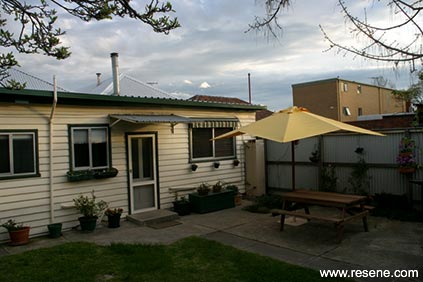
The untidy rear of the house before renovations.
The Australian climate is known for its extremes and searing heat. Humans can slip on a hat and slap on some sunscreen, and now an eco-friendly house in Melbourne is protected, thanks to Resene CoolColour™ technology.
When Kiwi-born architect Nic Owen was commissioned to renovate a run-down double-front Victorian cottage owned by the Cooke family, the brief included making it environmentally friendly.
As a result, the house now boasts a list of features not common in older inner-city homes. Aside from the Resene Cool Colour paint on the exterior, it uses plantation timbers and plywoods, both inside and out, has a huge 20,000 litre underground rain water tank and a solar hot water system. The house design also encourages natural cross-ventilation.
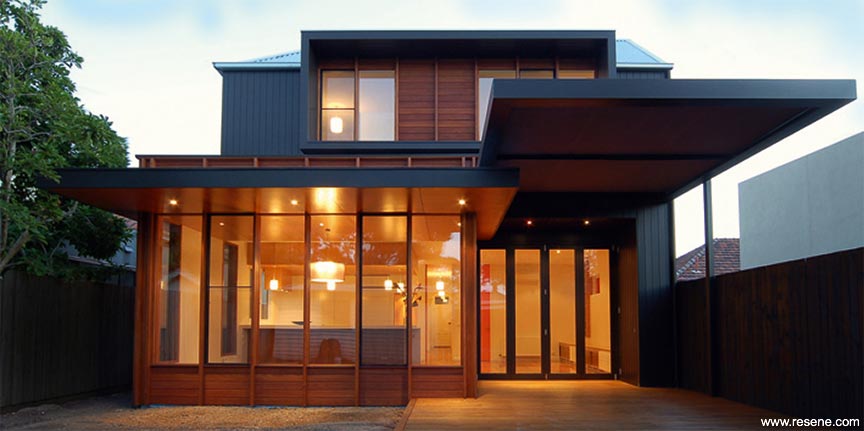
The Cookes, who have young children, wanted the renovation to give them extra space and an exciting place to live. All this on a small piece of land in a highly protected heritage precinct. In response, Nic Owen’s design solution employs clever use of light and space combined with a sprinkling of colour.
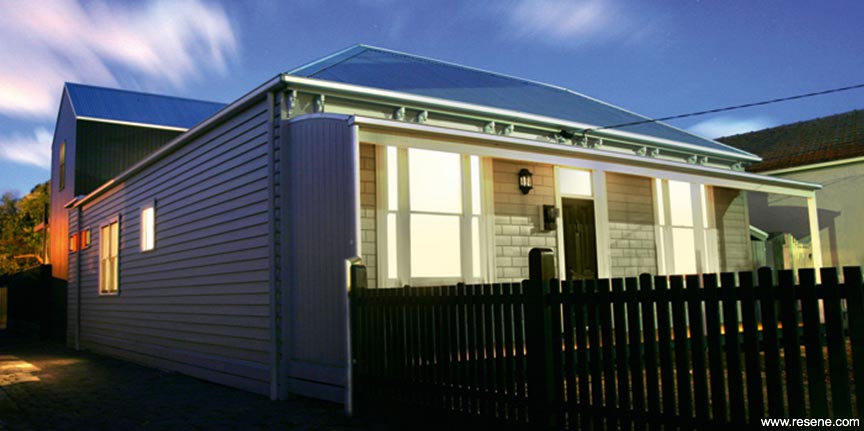
The overall design aesthetic was to be clean and timeless. To avoid the stark white often mechanical feel of many Modernist buildings, natural timbers and materials were used throughout the house, giving the spaces a warm and cosy feel. Splashes of colour and interesting architectural elements make the house an exciting place to live.
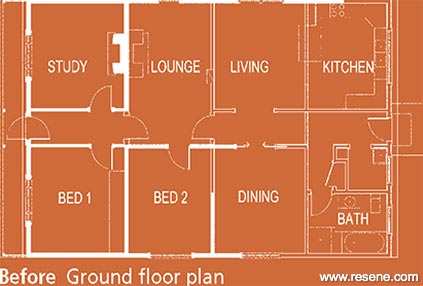
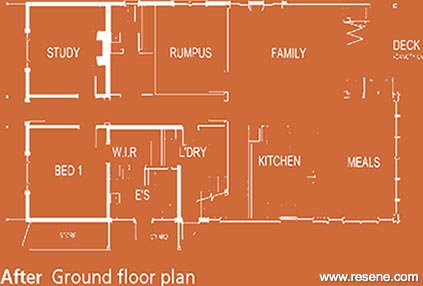
Although the interior scheme is mostly neutral (Resene Blanc), hot orange (Resene Phoenix) is used as an accent and the upstairs bedrooms have feature walls in Resene Norway (green) and Resene Jordy Blue.
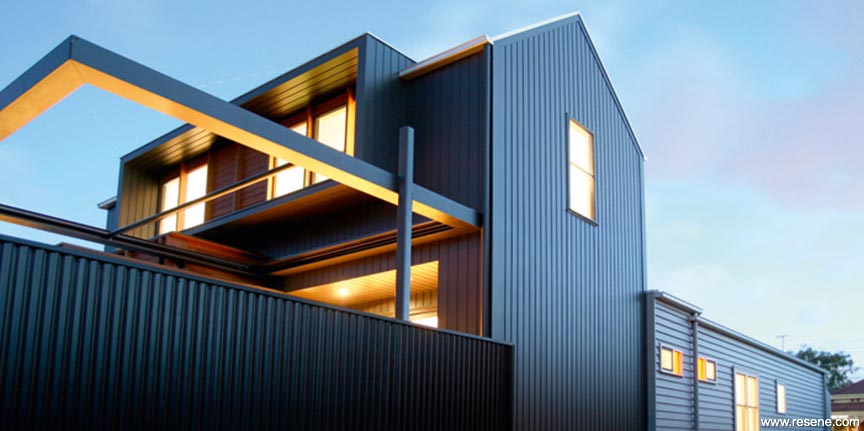
The rear of the house contains the main living area and kitchen. The feeling of openness and light is enhanced with skylights and well-placed windows yet the power of the sun is controlled with large overhanging eaves and a retractable shade cloth set within a rigid frame over the deck. This device is both the architect’s and owner’s favourite element in the design. When extended, the shade cloth is a practical complement to outdoor living; when withdrawn, it allows the frame to become a strong architectural feature.
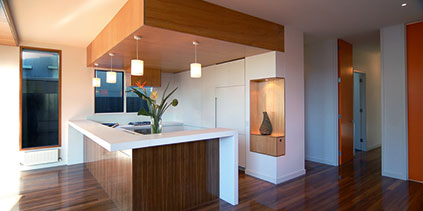
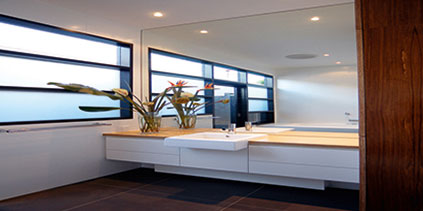
With this area facing due north, the shade cloth was essential as was the Resene Cool Colour technology – driven largely by the desire to use a dark colour (notorious for attracting heat) such as Resene Bokara Grey. The front exterior of the house is painted in Resene Friar Grey with Resene Rakaia trims.
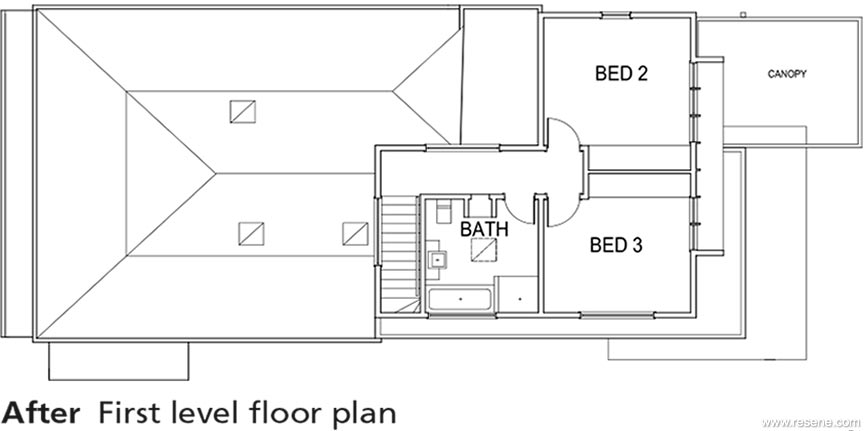
On the new upper floor, a deep frame around the windows also keeps out the hot summer sun and provides privacy to the bedrooms within.
The result is a house that is innovative, stimulating and demonstrates an environmentally sustainable design. “The house is both a machine for living and sculpture to live in,” says Nic.
And as Malcolm Cooke says: “We are loving our new home. It is a real luxury to have the house adapted to our specific needs, in a way which maximises the available space. Nic did a fantastic job at combining that very utilitarian objective with our desire to ensure it was also beautiful and well crafted. The design offers us alternative uses of rooms such as the playroom as our needs change.”
Did you know? Sunlight energy is made up of 44% visible light, 5% ultra-violet light and 51% infra-red light. Traditionally light reflectance values have been used to define which colours are suitable for heat prone substrates, however they ignore the effects of ultra-violet and infra-red light. Resene Cool Colour pigments are designed to reflect infra-red light that we can’t see, which is why they stay cooler than standard colours.
Traditionally, houses painted in dark colours have been difficult to maintain, given that they attract the sun’s heat, putting stress on both the paint and the cladding. Resene Cool Colour technology makes painting exterior surfaces in dark colours both easier and safer. It can be used on all sorts of exterior materials and applications, from weatherboards and concrete to windowsills.
A Resene Cool Colour looks the same as normal, but reflects much more heat. The pigment technology allows the coating to retain its usual visible shade, but gives heat back from the surface, reducing stress on the coating and substrate, and limiting subsequent heat-related damage. The technology also minimises the buildup of unwanted heat in the house, keeping cooling costs down.
Resene Cool Colour technology is available in a wide range of popular Resene colours and exterior finishes from your Resene ColorShop.
Search habitat magazine stories
Printed copies of habitat highlights are available from late March 2024 at Resene ColorShops and resellers, while stocks last. You can view back issues of habitat magazine online.
Specifiers:
If you have an idea, project or story that you think would suit habitat, we’d love to hear from you. Please drop us an email with your details and include photos if submitting a project.
Sign up for a DIY card and Save! Australia | New Zealand